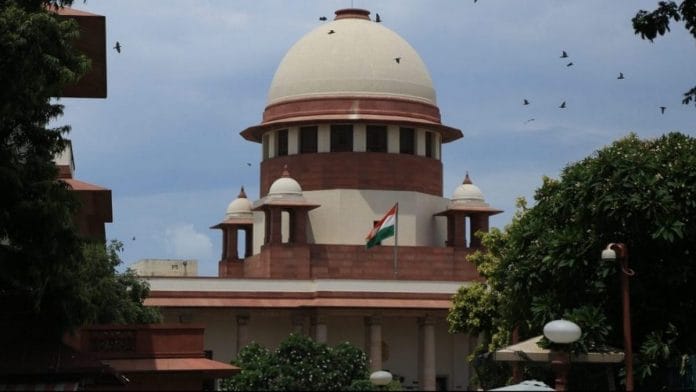New Delhi: After Supreme Court Registry officials were pulled up last week for “wrongful listing” of a petition jointly filed by advocate Prashant Bhushan, senior journalist N. Ram and former Union minister Arun Shourie, challenging the Constitutional validity of criminal contempt, it will now be heard by a bench led by Justice Arun Mishra.
The officials had listed the petition before a bench comprising Justice D.Y. Chandrachud and Justice K.M. Joseph even though the Justice Mishra-led bench was hearing the two contempt proceedings against Bhushan.
The petition filed by Bhushan, Ram and Shourie has also demanded a stay on these proceedings.
Sources in the SC Registry told ThePrint that this was the reason this petition should also have been listed before the same bench hearing the contempt cases against Bhushan, because a Supreme Court bench cannot stay the proceedings pending before another coordinate bench of the court.
“It is a cardinal principle of law that a coordinate bench cannot stay the proceedings of ongoing cases which are pending before another similar bench. This would have created a problem, as one Court cannot stay the proceedings of another Court having the same jurisdiction,” a source said.
Bhushan is facing two contempt cases in the Supreme Court.
One is related to an interview he gave to Tehelka in 2009, when he had made allegations of corruption against past chief justices of India. The SC decided to proceed with the decade-old contempt case Monday.
The second case was initiated for two of his tweets criticising the incumbent and past CJIs.
Also read: SC refuses to accept Prashant Bhushan’s explanation in 2009 contempt case
‘Rooted in colonial assumptions’
The petition filed by Bhushan, Shourie and Ram challenges the validity of Section 2(c)(i) of the Contempt of Courts Act 1971, asserting that the provision “is rooted in colonial assumptions and objects, which have no place in legal orders committed to democratic constitutionalism and the maintenance of an open robust public sphere”.
Section 2(c)(i) defines criminal contempt as “publication (whether by words, spoken or written, or by signs, or by visible representation, or otherwise) of any matter or the doing of any other act whatsoever which — scandalises or tends to scandalise, or lowers or tends to lower the authority of, any court”.
The provision, the petition states, “has the effect of threatening dissenters and critics into silence” and “silences legitimate criticism and dissent to the detriment of the health of the democracy”.
It also contends that the provision violates the right to freedom of speech and expression guaranteed under Article 19(1)(a) and creates a “chilling effect” on free speech. It submits that the offence of “scandalising the court” cannot be considered to be covered under the category of “contempt of court” under Article 19(2) of the Constitution, which permits reasonable restrictions on free speech.
The petition also claims that the provision violates the right to equality under Article 14 as it is “incurably vague”, leading to “subjective and greatly differing readings and application, which is incapable of being certain and even-handed”.
Also read: Tweets were against personal conduct of judges & not judiciary, Prashant Bhushan tells SC






